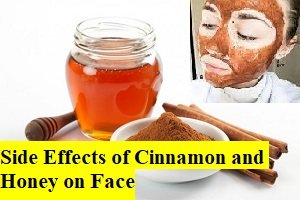Side Effects of Cinnamon and Honey on Face
Side Effects of Cinnamon and Honey on Face

The benefits of combining honey and cinnamon as a face mask have not been thoroughly researched.
Both have been studied separately, but the research on their effectiveness is mixed. Although most people have no trouble applying a honey and cinnamon mask, some people may be allergic to either ingredient.
If you are allergic to celery, pollen, or other bee-related products, honey applied to the skin may cause a reaction. Symptoms may include swallowing difficulties.
Side Effects of Cinnamon and Honey ~ what are the disadvantages of cinnamon and honey?
Sri Lanka, Indonesia, China, Vietnam, and Burma produce the majority of the world’s cinnamon.
According to recent research, cinnamon sold in retail stores contains high levels of coumarin and other toxic elements. Consuming large amounts of coumarin has been linked to an increased risk of developing cancerous tumors.
High Sugar Consumption
Honey contains a lot of sugar. A high-sugar diet can cause serious health problems such as heart disease.
Cinnamon is a spice that is extracted from the inner bark of the Cinnamomum tree.
It is widely used and has been linked to health benefits such as improved blood sugar control and a reduction in some risk factors for heart disease.
How much cinnamon can you eat without getting sick?
Cinnamon comes in two varieties:
- Cassia: The most common type, also known as “regular” cinnamon.
- Ceylon: Also known as “true” cinnamon, Ceylon has a milder, less bitter flavor.
Cassia cinnamon is more commonly found in supermarkets because it is less expensive than Ceylon cinnamon. Furthermore, excessive consumption of Cassia cinnamon has been linked to a variety of other side effects.
High doses of cinnamon may cause health problems.
Here are seven potential side effects of consuming too much Cassia cinnamon.
- May Cause Liver Damage
- May Increase the Risk of Cancer
- May Cause Mouth Sores
- May Cause Low Blood Sugar
- May Cause Breathing Problems
- May Interact with Certain Medications
- Allergies
Know Your Ingredient:
Honey
What Is It?
Honey is a sweet natural substance made up of glucose, fructose, polysaccharides (natural carbohydrates), water, proteins, minerals, and vitamins.
What are the five advantages of honey? the 5 benefits of honey?
Honey is mostly sugar, but it also contains trace amounts of vitamins and minerals and is high in plant compounds that promote health.
- High in antioxidants. • Better blood sugar levels than regular sugar. • Promotes burn and wound healing. • May help suppress coughing in children. • May improve heart health
Uses of honey and how often
Honey uses and how frequently it is used as a natural sweetener, honey is also used as an anti-inflammatory, antioxidant, and antibacterial agent.
Honey is commonly used to treat coughs orally and topically to treat burns and promote wound healing.
Because honey is a natural sweetener, it can be used as a healthy substitute for table sugar in foods and beverages.
Honey, as an excellent source of energy, stimulates the body’s metabolism. In the long run, regular use of honey can help with cough and throat irritation, as well as give you healthy, glowing skin and hair.
Side Effects of Honey
Certain components of honey, particularly bee pollen, cause sensitivities or allergies in some people
Although uncommon, bee pollen allergies can have serious, and sometimes fatal, consequences
- Wheezing and other asthmatic symptoms are signs and symptoms of a reaction.
- Dizziness
- Nausea
- Vomiting
- Weakness
- Excessive sweating.
- Fainting
- Abnormal heart rhythms (arrhythmias)
Know Your Ingredient:
Cinnamon
What exactly is it?
A light brown spice derived from the aromatic bark of a tree.
What Are Cinnamon Benefits?
It claims to treat wrinkles, acne, inflammation, and skin damage, as well as brighten the skin.
Uses of Cinnamon
It can be used to treat various skin problems by people of all skin types and ages.
How Often?
Cinnamon-containing skin care products can be used on a daily basis.
Caution
Cinnamon should be diluted before being applied to the skin. It can cause itchiness, discoloration, or a burning sensation.
Common question People also ask about the Side Effects of Cinnamon and Honey
How much honey is safe to consume per day?
“Honey, like all added sugars, should be treated with caution and kept to a minimum.”
The American Heart Association advises men to consume no more than nine teaspoons (36 grams) per day, and women and children to consume no more than six teaspoons (24 grams) per day.
Is it acceptable to apply honey and cinnamon to your face?
Some people choose to leave a cinnamon and honey face mask on their skin for 30 minutes.
Others will use the mask as a “spot treatment,” applying it to pimples and acne blemishes as a paste.
The choices are entirely dependent on the user, their skin concerns, and their skin type.
Can I apply cinnamon and honey to my face on a daily basis?
Apply a mixture of 1 tablespoon cinnamon powder and 3 tablespoons honey to your pimples. After 20 minutes, wash it off with warm water.
However, you should not use this treatment more than once or twice a week because it is quite potent and can irritate your skin.
What are the side effects of cinnamon on the face?
Cinnamon has no known side effects. However, excessive use may irritate your mouth and lips, resulting in sores.
It causes allergic reactions in some people. If you apply it to your skin, it may cause redness and irritation.
Is it safe to apply honey and cinnamon to my face overnight?
Here’s a mask to try: In a 3: 1 ratio, combine honey and cinnamon powder. Allow the paste to sit on your skin overnight.
Wash it off in the morning and enjoy all of the compliments! If your skin is constantly dry, it’s time to incorporate cinnamon into your skincare routine.
Cinnamon Adverse Impacts
Cinnamon has no known side effects. However, excessive use may irritate your mouth and lips, resulting in sores.
It causes allergic reactions in some people. If you apply it to your skin, it may cause redness and irritation.
Honey and cinnamon for acne Reviews ~ Does cinnamon and honey really work for acne?
The researchers concluded that adding honey to the acne regimen only improved the acne of four of the 53 patients.
Another study looked at 70 articles about cinnamon and discovered that it has antimicrobial and wound-healing properties.
Cinnamon for skin whitening
Cinnamon, which is high in antioxidants and beneficial plant compounds, is becoming increasingly popular as a skincare ingredient.
Proponents claim it can help treat hyperpigmentation and acne, lighten the skin, and reduce aging signs.

Ceylon cinnamon side effects
Cinnamon has no known side effects. However, excessive use may irritate your mouth and lips, resulting in sores.
It causes allergic reactions in some people. If you apply it to your skin, it may cause redness and irritation.
Turmeric honey and cinnamon face mask
In a mixing bowl, combine turmeric, cinnamon, and honey to make a smooth paste.
Apply this powerful mixture to clean the skin and leave it on for 15 to 20 minutes. Avoid contact with the eyes.
Ingredients:
- Organic turmeric – 1 teaspoon.
- Organic Cinnamon – 1 teaspoon.
- Raw honey – (enough to form a paste)
Cinnamon and honey face mask benefits
Benefits of honey cinnamon face mask:
- Moisturizes skin: Honey is a natural exfoliant that removes dull, dry skin and reveals new skin cells beneath
- Fights the signs of aging: Cinnamon is a powerful anti-aging agent.
Honey and cinnamon for skin lightening
Warm the mixture slightly in the microwave with three parts honey and one part freshly ground or pure cinnamon (“true” cinnamon).
Apply the mixture to your skin and leave it on for 8 to 10 minutes. Rinse thoroughly with warm water and pat your skin dry.

